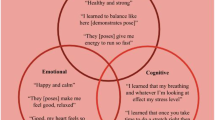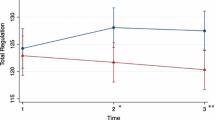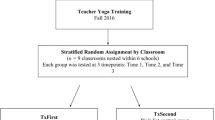Abstract
Self-regulation—the capacity to modulate attention and emotion—is a robust predictor of important outcomes across the life span. Contemplative practices, such as yoga and mindfulness, have been implemented in schools and shown to improve self-regulation. For the most part, studies incorporating contemplative practices have used quantitative methodologies aimed at generating measurable results on self-regulation. There is limited literature on children’s perceptions of how a contemplative practice helps them self-regulate, as well as the benefits that children report from participating in these practices. Furthermore, there is a shortage of work discussing how teachers may guide children towards learning about their bodily sensations, emotions, in addition to others’ emotions, during a yoga practice. To address these gaps in the literature, this article draws from theories in learning and development to explain why when children are given the space to experiment with yoga practices, they may better relate to their emotional experiences. Implications are discussed including guidelines to inform the future design and implementation of yoga programs in education.
Similar content being viewed by others
References
Blair, C., & Diamond, A. (2008). Biological processes in prevention and intervention: the promotion of self-regulation as a means of preventing school failure. Development and Psychopathology, 20(3), 899–911. https://doi.org/10.1017/s0954579408000436.
Blair, C., & Razza, R. P. (2007). Relating effortful control, executive function, and false belief understanding to emerging math and literacy ability in kindergarten. Child Development, 78(2), 647–663. https://doi.org/10.1111/j.1467-8624.2007.01019.x.
Bruner, J. S. (1996). The culture of education. Harvard University Press.
Carlson, S. M., & Moses, L. J. (2001). Individual differences in inhibitory control and children’s theory of mind. Child Development, 72(4), 1032–1053. https://doi.org/10.1111/1467-8624.00333.
Cook, S. W., Mitchell, Z., & Goldin-Meadow, S. (2008). Gesturing makes learning last. Cognition, 106(2), 1047–1058. https://doi.org/10.1016/j.cognition.2007.04.010.
Davidson, R., Dunne, J., Eccles, J. S., Engle, A., Greenberg, M., Jennings, P., et al. (2012). Contemplative practices and mental training: prospects for American education. Child Development Perspectives, 6(2), 146–153. https://doi.org/10.1111/j.1750-8606.2012.00240.x.
Diamond, A. (2012). Activities and programs that improve children’s executive functions. Current Directions in Psychological Science, 21(5), 335–341. https://doi.org/10.1177/0963721412453722.
Ergas, O. (2013). Descartes in a ‘headstand’: introducing ‘body-oriented pedagogy. Paideusis, 21(1), 4–12. https://doi.org/10.31231/osf.io/g5cth.
Felver, J. C., Celis-de Hoyos, C. E., Tezanos, K., & Singh, N. N. (2016). A systematic review of mindfulness-based interventions for youth in school settings. Mindfulness, 7(1), 34–45. https://doi.org/10.1007/s12671-015-0389-4.
Flook, L., Goldberg, S. B., Pinger, L., & Davidson, R. J. (2015). Promoting prosocial behavior and self-regulatory skills in preschool children through a mindfulness-based kindness curriculum. Developmental Psychology, 51(1), 44–51. https://doi.org/10.1037/a0038256.
Gard, T., Noggle, J. J., Park, C. L., Vago, D. R., & Wilson, A. (2014). Potential self-regulatory mechanisms of yoga for psychological health. Frontiers in Human Neuroscience, 8, 770. https://doi.org/10.3389/fnhum.2014.00770.
Gibbs, R. W., Jr. (2005). Embodiment and cognitive science. Cambridge University Press.
Goldin-Meadow, S. (2000). Beyond words: the importance of gesture to researchers and learners. Child Development, 71(1), 231–239. https://doi.org/10.1111/1467-8624.00138.
James, W. (1884). What is an emotion? Mind, 9(34), 188–120. https://doi.org/10.1093/mind/os-ix.34.188.
Jennings, P. A. (2016). Mindfulness-based programs and the American public school system: recommendations for best practices to ensure secularity. Mindfulness, 7(1), 176–178. https://doi.org/10.1007/s12671-015-0477-5.
Kabat-Zinn, J. (2003). Mindfulness-based interventions in context: past, present, and future. Clinical Psychology: Science and Practice, 10(2), 144–156. https://doi.org/10.1093/clipsy/bpg016.
Lazarus, R. S. (1991). Cognition and motivation in emotion. American Psychologist, 46(4), 352–367. https://doi.org/10.1037/0003-066x.46.4.352.
Maynard, B. R., Solis, M. R., Miller, V. L., & Brendel, K. E. (2017). Mindfulness-based interventions for improving cognition, academic achievement, behavior, and socioemotional functioning of primary and secondary school students. Campbell Systematic Reviews, 5, 1–147. https://doi.org/10.4073/csr.2017.5.
Moffitt, T. E., Arseneault, L., Belsky, D., Dickson, N., Hancox, R. J., Harrington, H., et al. (2011). A gradient of childhood self-control predicts health, wealth, and public safety. Proceedings of the National Academy of Sciences, 108(7), 2693–2698. https://doi.org/10.1073/pnas.1010076108.
Moreno, A. J. (2017). A theoretically and ethically grounded approach to mindfulness practices in the primary grades. Childhood Education, 93(2), 100–108. https://doi.org/10.1080/00094056.2017.1300487.
Novack, M., & Goldin-Meadow, S. (2015). Learning from gesture: how our hands change our minds. Educational Psychology Review, 27(3), 405–412. https://doi.org/10.1007/s10648-015-9325-3.
Piaget, J. (1969). The psychology of the child. New York: Basic Books.
Poehlmann-Tynan, J., Vigna, A. B., Weymouth, L. A., Gerstein, E. D., Burnson, C., Zabransky, M., et al. (2016). A pilot study of mindful practices with economically disadvantaged preschoolers: children’s empathic and self-regulatory behaviors. Mindfulness, 1–13. https://doi.org/10.1007/s12671-015-0426-3.
Razza, R. A., Bergen-Cico, D., & Raymond, K. (2013). Enhancing preschoolers’ self- regulation via mindful yoga. Journal of Child and Family Studies, 24(2), 372–385. https://doi.org/10.1007/s10826-013-9847-6.
Rice, J. A. (2013). The kindness curriculum: stop bullying before it starts. Redleaf Press.
Rimm-Kaufman, S. E., Pianta, R. C., & Cox, M. J. (2000). Teachers’ judgments of problems in the transition to kindergarten. Early Childhood Research Quarterly, 15(2), 147–166. https://doi.org/10.1016/s0885-2006(00)00049-1.
Roeser, R. W., & Peck, S. C. (2009). An education in awareness: self, motivation, and self-regulated learning in contemplative perspective. Educational Psychologist, 44(2), 119–136. https://doi.org/10.1080/00461520902832376.
Sawyer, R. K., John-Steiner, V., Moran, S., Sternberg, R. J., Feldman, D. H., Nakamura, J., & Csikszentmihalyi, M. (2003). Creativity and development. Counterpoints: Cognition, Memo. https://doi.org/10.1093/acprof:oso/9780195149005.001.0001.
Schmalzl, L., Crane-Godreau, M. A., & Payne, P. (2014). Movement-based embodied mindful practices: definitions and paradigms. Frontiers in Human Neuroscience, 8, 8. https://doi.org/10.3389/fnhum.2014.00205.
Schmalzl, L., Powers, C., & Blom, E. H. (2015). Neurophysiological and neurocognitive mechanisms underlying the effects of yoga-based practices: towards a comprehensive theoretical framework. Frontiers in Human Neuroscience, 9. https://doi.org/10.3389/fnhum.2015.00235.
Semple, R. J., Droutman, V., & Reid, B. A. (2017). Mindfulness goes to school: things learned (so far) from research and real-world experiences. Psychology in the Schools, 54(1), 29–52. https://doi.org/10.1002/pits.21981.
Semple, R. J., Lee, J., Rosa, D., & Miller, L. F. (2010). A randomized trial of mindfulness-based cognitive therapy for children: promoting mindful attention to enhance social-emotional resiliency in children. Journal of Child and Family Studies, 19(2), 218–229. https://doi.org/10.1007/s10826-009-9301-y.
Shapiro, S. L., Lyons, K. E., Miller, R. C., Butler, B., Vieten, C., & Zelazo, P. D. (2015). Contemplation in the classroom: a new direction for improving childhood education. Educational Psychology Review, 27(1), 1–30. https://doi.org/10.1007/s10648-014-9265-3.
Stapp, A. C., & Wolff, K. (2017). Young children’s experiences with yoga in an early childhood setting. Early Child Development and Care, 1–14. https://doi.org/10.1080/03004430.2017.1385607.
Thom, L. (2010). From simple line to expressive movement: the use of creative movement to enhance socio-emotional development in the preschool curriculum. American Journal of Dance Therapy, 32(2), 100–112. https://doi.org/10.1007/s10465-010-909.
Vygotsky, L. S. (1978). Mind in society. Cambridge: Harvard University Press.
Zelazo, P. D., Forston, J. L., Masten, A. S., & Carlson, S. M. (2018). Mindfulness plus reflection training: effects on executive function in early childhood. Frontiers in Psychology, 9, 208. https://doi.org/10.3389/fpsyg.2018.00208.
Zelazo, P. D., & Lyons, K. E. (2012). The potential benefits of mindfulness training in early childhood: a developmental social cognitive neuroscience perspective. Child Development Perspectives, 6(2), 154–160. https://doi.org/10.1111/j.1750-8606.2012.00241.x.
Zelazo, P. D. (2015). Executive function: reflection, iterative reprocessing, complexity, and the developing brain. Developmental Review, 38, 55–68. https://doi.org/10.1016/j.dr.2015.07.001.
Acknowledgments
The Mind & Life Institute (via the Contemplative Education Grant, Grant ID Number: A-13146632) financially supported this line of inquiry.
Author information
Authors and Affiliations
Corresponding author
Ethics declarations
Disclosure Statement
In accordance with Taylor & Francis policy and our ethical obligations as researchers, we are reporting that we do not have a financial and/or business interests in a company that may be affected by the thoughts reported in the enclosed paper. Any views, findings, conclusions, or recommendations expressed in this article do not necessarily reflect those of the Mind & Life Institute.
Additional information
Publisher’s Note
Springer Nature remains neutral with regard to jurisdictional claims in published maps and institutional affiliations.
Rights and permissions
About this article
Cite this article
Rashedi, R.N., Schonert-Reichl, K.A. Yoga and Willful Embodiment: a New Direction for Improving Education. Educ Psychol Rev 31, 725–734 (2019). https://doi.org/10.1007/s10648-019-09481-5
Published:
Issue Date:
DOI: https://doi.org/10.1007/s10648-019-09481-5




